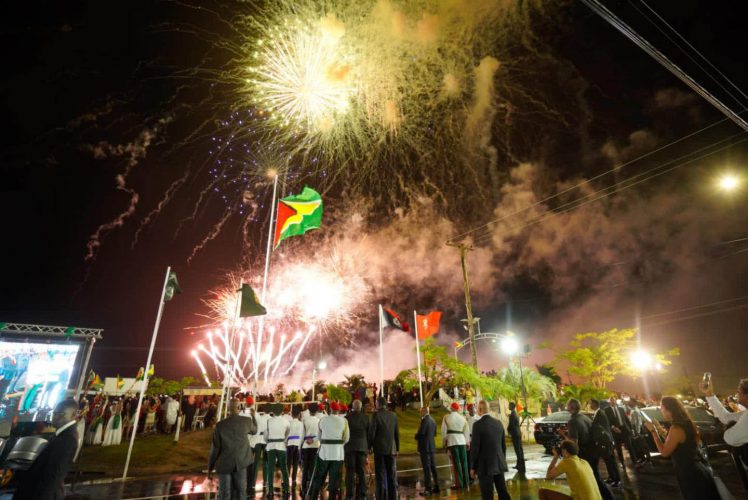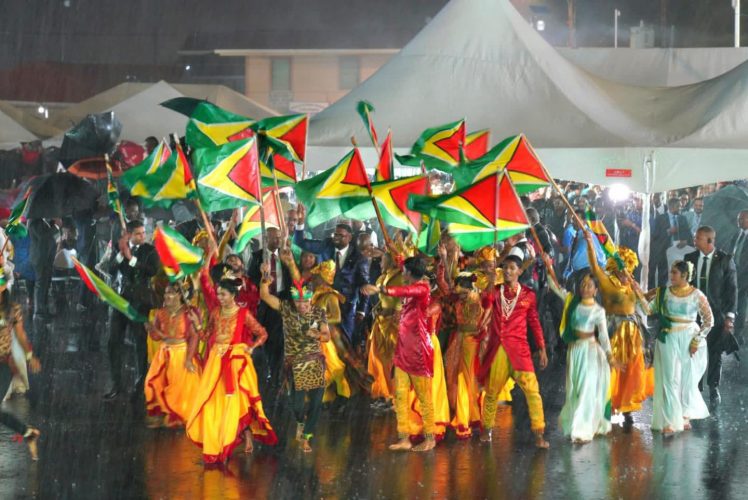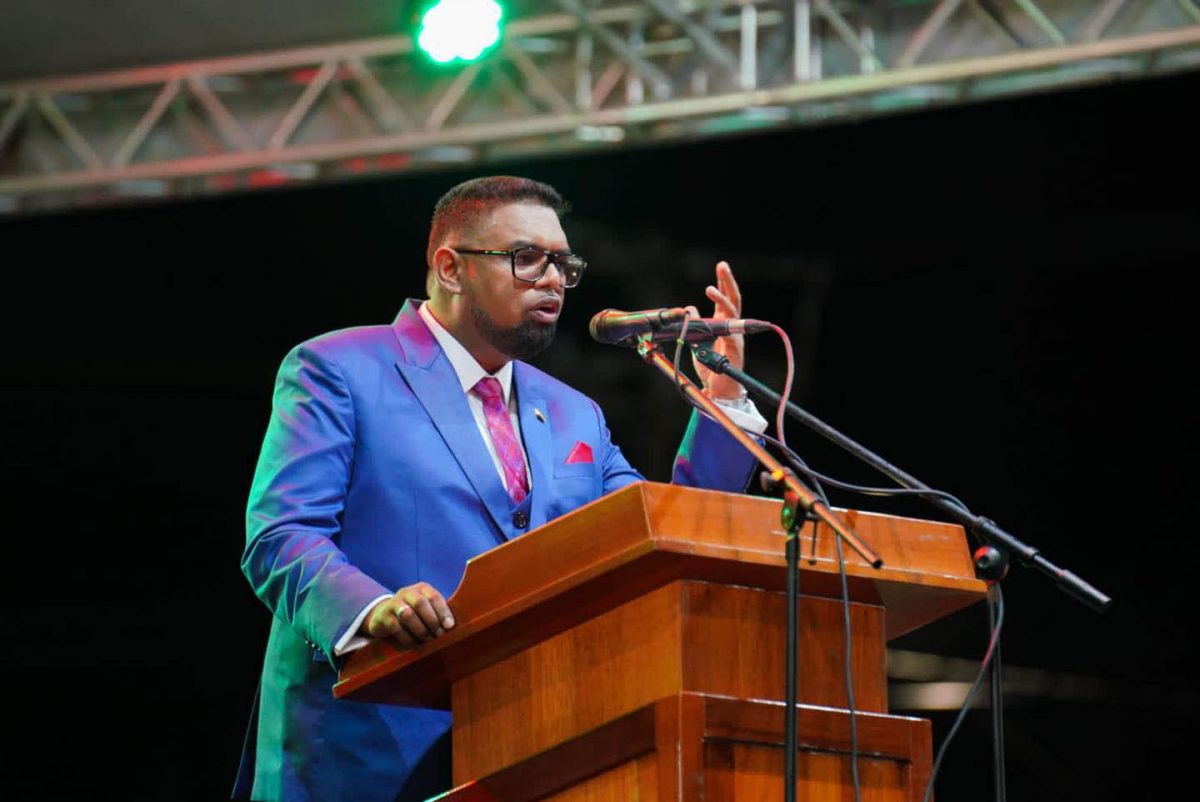…says country’s prosperity must benefit every citizen
Addressing hundreds of persons at the Anna Regina Market Square on the Essequibo Coast on Wednesday, President Irfaan Ali talked up his government’s investment in the development of transportation systems in Guyana while committing to ensuring that efficiency is achieved.
The President was in Region Two for the National Flag Raising ceremony celebrating the country’s 56th Independence Anniversary. This is the first time that the ceremony was moved from the capital city and Essequibians braved heavy rainfall to sit through the almost three-hour programme that culminated with the raising of the Golden Arrowhead at midnight and a fireworks display by the Guyana Defence Force’s pyrotechnics arm.


Ali, in his address, said that it is almost two years since his government assumed office and it has been heavily focused on the transformation of Guyana. He said that works have been significantly advanced on increasing the efficiency of the transportation system and reducing the burden to commuters.
He said that in less than two years, his government has been able to plan, design and complete the feasibility study, raised the financing and commenced implementation of a comprehensive highway development plan. Explaining that plan, he pointed to the recently completed Mandela Avenue to Eccles four-lane bypass road and the commencement of the second phase of the project from Eccles to Diamond on the East Bank of Demerara.
“In addition, we have signed a contract for the commencement of the Ogle to Eccles four-lane superhighway. Only today [Wednesday] we have tendered the initial phase of a new West Demerara four-lane highway from Crane to Schoonord. This new four-lane road will be linked to one of our largest transport investments, the new four-lane Demerara Harbour Bridge, the contract for which was signed this morning [as well],” Ali said.
Based on the invitation to bid for the project, it is being executed by the Central Housing and Planning Authority (CH&PA) and bids will be opened by the National Procurement and Tender Administration Board on June 13, 2022. The project is divided into eight lots.
Talking up the benefits of the proposed four-lane highway and the new Demerara River crossing, Ali said that Essequibians are aware of the time they lose when transporting produce to the major markets in the city because of the congestion on the roadways. He said that the government is cognizant of the constraints of the ageing Demerara Harbour Bridge and its effects on the transportation system.
“Not only will this investment bring relief to 60% of our population living in Regions Three and Four and those of the population from Region Two that cross every day to get into the market. But there are some other softer benefits. There are some other tangible benefits that I want us to examine and explore.
“For any country to advance we need to increase our productivity, we need to make the best use of our productive time. Approximately 22,000 vehicles cross the Demerara Harbour Bridge every day [and] on average each vehicle loses a minimum of two hours because of the congestion of the bridge and on the existing highways. [The] two hours they lose means that each vehicle loses 44,000 hours every day. If an average of three persons is in that vehicle, we are losing an average of 132,000 hours every single day, and 132,000 hours of productivity. If you calculate this into days, you will see that the collective time that we lose every day because of the congestion is 16,000 plus man-days. If you take a financial value on that, you will see that tens of millions of dollars we lose annually just taking that one indicator,” Ali stated.
He said that once completed, the new bridge coupled with expanded road networks will allow for a faster and more efficient commute.
Quality of life
“These are the benefits that we must not lose sight of because development and prosperity must bring with it an improvement in your quality of life and you cannot have an improvement in your quality of life if you’re sitting for three hours, four hours every day in the traffic,” Ali related.
The President added that improving the transportation systems is not just limited to Regions Three and Four but also extends throughout Guyana. He disclosed that the government has already completed the design, and feasibility and tendered the initial phase of the expansion of the Berbice Highway from New Amsterdam to Moleson Creek. He said that expansion will be connected to the new Corentyne River Bridge which is to be constructed in partnership with Suriname.
“…you might say how does that relate to you in Essequibo, well, my dear brothers and sisters that relate to all of Guyana because we will be expanding our markets. We will be opening up a new frontier of development. We will be opening up the opportunity to create an energy corridor to expand logistics and trade. We will be creating jobs and expanding the reach of Guyana and this is what is critical. We are embarking on infrastructure that is transformative, infrastructure that will bring real benefit and real opportunities,” he said while referencing the recently signed contract for the Linden to Mabura road.
He said that the government has already awarded contracts for the construction of 32 new concrete bridges in accordance with the international highway specifications at a cost of approximately US$15 million.
Ali also announced that the government is anticipating approval of a US$120 million loan from the Islamic Development Bank to pave the Linden-Soesdyke Highway.
The President added that the government is also placing heavy emphasis on the development of community infrastructure explaining that big infrastructure cannot stand alone without the support of equal community development.
“We know that there are gaps. We know that there is still a lot to be done. We know that you want us to move at a faster pace. We know that you want more but we know that within the constraints globally and regionally that we have been delivering for you in advance and ahead of the manifesto pledges that we came to you (with) when we signed that social contract.
“In addition to these initiatives, understanding the need to access new areas of growth and to open up new lands for new opportunities, we have commenced work on surveys and clearing the alignment for Timehri – Sand Hill, Bartica road links [and] the Parika – Goshen roadway and outside of the coastal infrastructure we have spent more than $5 billion to support hinterland infrastructure and hinterland development. So that you can have economic expansion, the loggers, the miners, the communities can all benefit from this transformative agenda. In keeping with our vision to connect communities, we have already commenced work on creating road links between villages and between Regions from Moruca to Kwebanna, Wauna to Mabaruma, upgrading roads in Matarkai sub-districts [and] building infrastructure in South Rupununi and connecting roads between Region Eight and Nine, just to mention a few,” he boasted.
Prosperity for all
In his address, Ali said that Guyana is on the path to prosperity and every Guyanese must benefit. He said that the country is registering high levels of growth and it is expected to be sustained.
“…we understand far too well as your government that our economy in the lives of people cannot be measured by numbers. It cannot be measured by a balance sheet. So for us, growth is much more than an economic indicator. Real growth must uplift all the people of our country together into prosperity. Every family must rise and enjoy the development that is going to take place. That is what is real growth for this government when every family can feel a part of, can be a part of and can arise with the rising tide that all Guyanese will enjoy under this government and under the growth and development of our country,” Ali said.
Throughout his address, Ali laid out his case for citizens to measure the accomplishments of his government. He talked about the various projects aimed at reducing electricity costs and propelling the manufacturing sector. He also made a commitment to a “broad-based consultative process to electoral reforms”.






